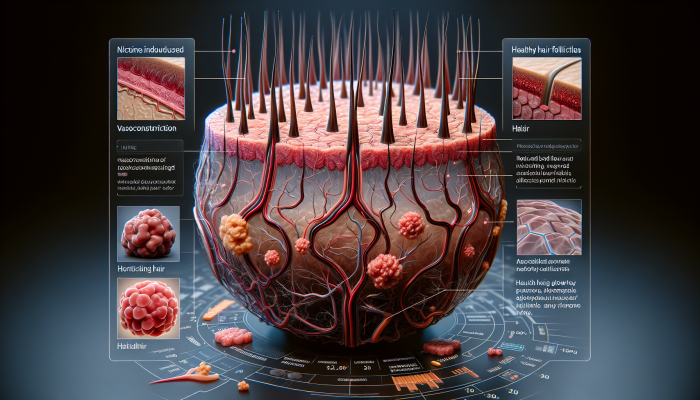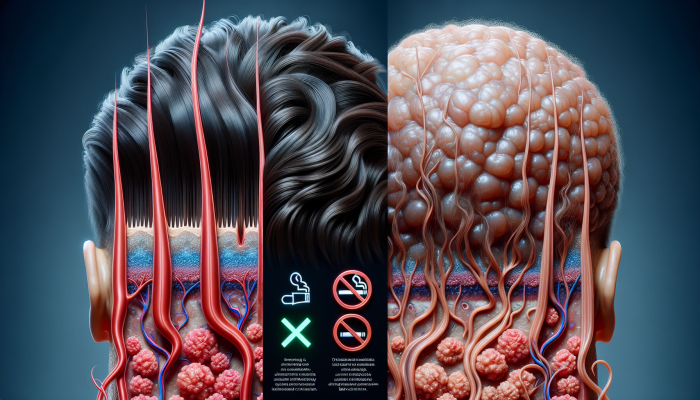Uncovering the Detrimental Effects of Smoking on Hair Growth and Health
Smoking is widely acknowledged as harmful to overall health, but its impact on hair health is particularly alarming. The multitude of toxic chemicals found in cigarette smoke can inflict severe damage on hair follicles, leading to a series of adverse effects that impede optimal hair growth. Grasping these mechanisms is crucial for anyone looking to boost their hair vitality, especially current or former smokers. By understanding the link between smoking and hair health, individuals can engage in proactive strategies to enhance their hair condition and, in turn, improve their overall well-being.
Examining the Impact of Nicotine on Blood Flow and Hair Follicle Health

Nicotine, the primary addictive component in cigarettes, is infamous for its ability to induce vasoconstriction, which severely hampers blood circulation to hair follicles. This diminished blood flow restricts essential nutrients and oxygen from reaching the follicles, which are vital for their survival and growth. Healthy hair follicles rely on a consistent supply of nutrients to thrive, and any interruption to this flow can drastically reduce hair growth rates. Many smokers have reported experiencing slower hair growth compared to non-smokers, illustrating nicotine's detrimental effects on hair vitality.
The consequences of nicotine’s impact on blood circulation extend beyond merely limiting nutrient delivery. Inadequate blood flow can also hinder hair follicles from effectively removing waste products, resulting in the accumulation of toxins that create an unhealthy environment for hair development. This toxic buildup may contribute to thinning hair and, ultimately, hair loss. The intricate nature of these interactions underscores the significant impact of smoking on hair health, with both immediate and long-term repercussions for individuals affected.
Moreover, research indicates that chronic smoking can lead to irreversible alterations in the functioning of hair follicles. The persistent presence of nicotine can disrupt natural hair growth cycles, pushing more hair into the telogen (resting) phase while limiting the number of follicles actively producing hair. As a result, the cumulative effects of nicotine can be devastating for individuals aiming to preserve or enhance their hair health over time.
Delving Into the Role of Oxidative Stress in Accelerating Hair Loss
The well-established connection between smoking and oxidative stress is thoroughly documented in scientific literature. Cigarette smoke contains numerous free radicals that can wreak havoc on cells throughout the body, including the delicate cells within the scalp. This spike in oxidative stress profoundly affects hair follicles, leading to cellular dysfunction and a hastened rate of hair loss, which poses a significant concern for anyone committed to maintaining their hair health.
As oxidative stress induced by smoking intensifies, hair follicles become increasingly vulnerable to damage. Research indicates that heightened oxidative stress can provoke inflammation and apoptosis (cell death) within hair follicles, exacerbating issues of thinning and hair loss. The cumulative ramifications of these processes highlight how smoking can perpetuate a vicious cycle of poor hair health, making it a critical area of concern for those worried about their hair condition.
Furthermore, the influence of smoking on oxidative stress not only affects hair growth but also diminishes the overall quality of hair. Compromised hair follicles produce strands that are weak and susceptible to breakage, further complicating the difficulties faced by smokers who may already be grappling with reduced hair health. By actively addressing oxidative stress through lifestyle changes or quitting smoking, individuals can experience substantial improvements in their hair's vitality and overall appearance.
Investigating the Influence of Hormonal Imbalances from Smoking on Hair Loss
Hormones play a crucial role in regulating hair growth, and smoking can disrupt the delicate balance of these hormones. The impact of smoking on hormonal levels can result in conditions such as androgenetic alopecia, a prevalent form of hair loss marked by thinning hair on the scalp. This disruption occurs due to smoking's effects on adrenal and sex hormones, which can interfere with the normal hair growth cycle.
Studies have revealed that smoking can elevate levels of dihydrotestosterone (DHT), a potent androgen associated with hair loss. Increased DHT levels can lead to the miniaturization of hair follicles, causing them to produce thinner and weaker strands of hair. For individuals with a genetic predisposition to hair loss, smoking can significantly exacerbate the condition, accelerating both the onset and progression of this issue.
The hormonal fluctuations linked to smoking can also disrupt the various phases of hair growth, potentially forcing more hair into the telogen (resting) phase prematurely. This shift often results in excessive shedding, compounding the challenges smokers face concerning their hair health. Understanding the relationship between smoking and hormonal imbalances is essential for individuals looking to comprehend and combat hair loss effectively.
Recognizing the Crucial Role of Scalp Circulation for Promoting Healthy Hair Growth

Maintaining optimal scalp circulation is vital for supporting healthy hair follicles and fostering robust hair growth. The vasoconstrictive properties of smoking lead to reduced blood flow to the scalp, adversely affecting its overall health and vitality. This diminished circulation can obstruct the delivery of essential nutrients and oxygen, both of which are critical for nurturing active hair follicles and stimulating vigorous hair growth.
When blood flow to the scalp is compromised, hair follicles may lack the necessary support they require to thrive. This insufficiency can lead to various complications, including hair thinning and increased vulnerability to environmental stressors. The impact of smoking on hair health is thereby aggravated by this decline in circulation, making it increasingly difficult for smokers to maintain a healthy and full head of hair.
Additionally, inadequate circulation can hinder the natural processes that sustain scalp health. A well-circulated scalp is essential for supporting cellular regeneration and maintaining a balanced environment. Without proper circulation, the scalp may become dry, flaky, or even inflamed, further exacerbating the challenges associated with hair loss. For smokers, recognizing the importance of scalp health and circulation is crucial for reversing the adverse effects linked to their smoking habits.
Understanding the Consequences of Toxin Accumulation in Hair
The harmful toxins found in cigarette smoke can accumulate within the hair shaft, leading to a deterioration of overall hair health. Hair tends to act as a reservoir for various substances, including the multitude of toxic chemicals inherent in cigarettes. Over time, this buildup of toxins can jeopardize the structural integrity of the hair, rendering it more prone to breakage and loss.
As hair becomes increasingly saturated with toxins, its capacity to retain moisture diminishes substantially. This often manifests as hair that appears dry and brittle, lacking vitality and shine. Smokers may observe that their hair not only becomes more fragile but also loses the lustrous sheen typically associated with healthy hair. These aesthetic changes are frequently a direct result of the impact of smoking on hair health.
Moreover, the presence of these toxins can undermine the effectiveness of hair care products. When hair suffers due to the accumulation of harmful substances, it may become less responsive to treatments and products aimed at nourishing and restoring health. This frustrating cycle can lead to increased dissatisfaction for individuals striving to improve their hair's condition, as the very products intended to assist may become less effective.
Assessing the Negative Effects of Smoking on Hair Quality
The overall quality of hair is influenced by various factors, including lifestyle choices, environmental stressors, and general health. Among these, smoking has been shown to adversely affect hair quality, leading to a series of negative outcomes that can impact both appearance and health.
Understanding How Smoking Induces Hair Dryness and Brittleness

One of the most immediate repercussions of smoking on hair quality is the heightened dryness and brittleness that affects the hair structure. The toxic compounds present in cigarette smoke can strip hair of its natural oils, leading to a deficiency in moisture and essential nutrients. This depletion results in hair that feels coarse and rough, making it increasingly vulnerable to snapping under minimal strain.
The drying effects of smoking are not merely superficial; they can lead to long-lasting damage over time. Without adequate moisture, hair loses its elasticity and becomes more susceptible to breakage. Smokers frequently report that their hair does not respond well to styling or treatments, as the necessary structural integrity for healthy hair has been compromised. This detrimental impact of smoking on hair health can create a frustrating cycle of damage and repair that proves difficult to overcome.
Furthermore, the increased brittleness can create a series of implications for styling choices. Smokers may feel compelled to limit their styling options, opting for less damaging techniques that may prolong the lifespan of their hair. However, the underlying issues persist, often necessitating a more comprehensive and holistic approach to hair care.
Investigating How Smoking Increases Hair Porosity
Smoking can also lead to increased hair porosity, which refers to the hair's ability to effectively absorb and retain moisture. Hair with high porosity is more susceptible to damage caused by environmental factors, such as humidity and pollution, as well as from various styling products. The toxins found in cigarette smoke can alter the hair cuticle, making it more porous and less capable of protecting itself from external aggressors.
When hair becomes more porous, it tends to absorb moisture quickly; however, it also loses that moisture just as rapidly. This fluctuation creates an unstable environment for maintaining hair health, often resulting in frizz and uneven texture. Smokers might find that their hairstyles do not hold as well, as increased porosity diminishes the hair's ability to maintain shape and form effectively.
Managing high porosity hair typically requires a targeted approach involving specialized products designed to strengthen and protect the hair. Smokers may find themselves increasingly reliant on conditioners and treatments to mitigate the effects of porosity, leading to greater product dependency and expense. This reality underscores the significant impact of smoking on hair health, as it can generate a variety of challenges that demand ongoing attention and care.
Investigating the Link Between Smoking and Premature Greying
Research has identified a correlation between smoking and premature greying of hair, a concern that resonates with many individuals. The mechanisms involved include the damage inflicted by cigarette smoke on melanin-producing cells within hair follicles. Melanin is responsible for imparting color to hair, and when its production is disrupted, premature greying can occur.
The oxidative stress induced by smoking plays a pivotal role in this process. Free radicals generated from smoking can harm melanocytes, the cells responsible for producing melanin, thereby accelerating the greying process. Smokers may find themselves encountering grey hairs at an earlier age than non-smokers, which can significantly affect their self-image and confidence.
Interventions aimed at combating premature greying often involve addressing the underlying causes, such as quitting smoking, adopting healthier lifestyle habits, and incorporating antioxidant-rich foods into one’s diet. Recognizing the impact of smoking on hair health is fundamental to reversing or mitigating these effects and fostering a return to vibrant, youthful hair.
Understanding the Relationship Between Smoking and Hair Loss
The troubling issue of hair loss and thinning is alarmingly common among smokers. As previously mentioned, smoking significantly reduces blood circulation to the scalp, directly affecting hair growth. When hair follicles are deprived of essential nutrients and oxygen, they may struggle to produce healthy hair, leading to increased shedding and thinning over time.
Studies have shown that smokers are more likely to experience hair loss compared to their non-smoking counterparts. This correlation arises from various factors, including the impacts of nicotine, oxidative stress, and hormonal imbalances discussed earlier. The cumulative effects of these elements can lead to a marked decrease in hair density and volume, making it a pressing concern for smokers.
For individuals dealing with hair loss attributed to smoking, seeking support can be crucial. This may involve consulting healthcare professionals, considering nutritional supplements, or exploring hair restoration options. Recognizing the impact of smoking on hair health empowers individuals to make informed decisions regarding their hair care journey and take proactive steps towards improvement.
Investigating the Connection Between Smoking and Scalp Health
Scalp health is often overlooked in discussions about hair care; however, it plays an essential role in the overall vitality and appearance of hair. Smoking introduces numerous challenges to maintaining scalp health, which can have direct repercussions on hair growth and quality.
Tackling Inflammation and Irritation Induced by Smoking
One of the primary concerns associated with smoking is its potential to cause inflammation and irritation of the scalp. The toxic compounds found in cigarette smoke can trigger inflammatory responses, leading to conditions such as dandruff and seborrheic dermatitis. These scalp conditions can lead to discomfort and create an unhealthy environment that impedes proper hair growth.
Inflammation can disrupt the normal functioning of hair follicles, compromising the hair growth cycle. The irritation caused by smoking may manifest as itching, redness, and flaking, which significantly detracts from an individual's overall hair health. Smokers may find themselves grappling with various scalp issues that complicate their hair care efforts and hinder progress.
Addressing inflammation necessitates a multifaceted approach, which includes quitting smoking and integrating anti-inflammatory scalp treatments into one’s routine. These strategies can help restore equilibrium to the scalp, fostering a more favorable environment for healthy hair growth. Recognizing the impact of smoking on hair health is essential for anyone seeking to enhance their overall scalp condition and hair vitality.
Examining the Negative Effects of Reduced Scalp Circulation
As previously noted, smoking leads to diminished blood circulation, which can adversely affect scalp health. The vasoconstrictive nature of nicotine restricts the delivery of essential nutrients to the scalp, undermining the health of hair follicles and the surrounding skin. This impaired circulation can obstruct the natural processes necessary for healthy hair growth, resulting in a variety of complications.
When blood flow is diminished, the scalp becomes less responsive to treatments and more susceptible to a range of issues, including dryness and irritation. The repercussions of poor scalp circulation extend beyond short-term discomfort; over time, they can contribute to a gradual decline in hair health and an increased risk of hair loss. For smokers, enhancing scalp circulation is vital for reversing the damaging impact of smoking on hair health and fostering a thriving environment for hair growth.
Heightened Risk of Scalp Infections Associated with Smoking
A compromised immune system is another consequence of smoking, which elevates the risk of infections affecting the scalp. Smokers may find themselves more vulnerable to fungal and bacterial infections, resulting in various scalp conditions that can inhibit healthy hair growth. This increased susceptibility can further complicate hair health, as infections can provoke inflammation and damage to hair follicles.
Conditions such as folliculitis, which involves the inflammation of hair follicles, can be worsened by the existing challenges posed by smoking. The presence of infections creates an unfavorable environment for hair, leading to excessive shedding and potential scarring of follicles. Smokers must stay vigilant about their scalp health to mitigate these risks and protect their hair from the adverse effects associated with infections.
Preventive measures can include maintaining a clean scalp, utilizing anti-fungal or anti-bacterial treatments when necessary, and addressing any underlying health issues. Recognizing the impact of smoking on hair health is crucial for smokers who wish to preserve their hair and maintain their overall scalp condition.
Discovering the Positive Changes Following Smoking Cessation for Hair Recovery
The journey toward improved hair health can commence with the decision to quit smoking. Although the cessation process may appear daunting, the positive effects on hair health can be substantial and transformative, leading to significant improvements over time.
Boosting Blood Flow After Quitting Smoking
One of the most immediate benefits experienced upon quitting smoking is the enhancement of blood circulation to the scalp. As the body begins to heal from smoking's harmful effects, blood vessels can dilate, facilitating increased blood flow. This improved circulation promotes the delivery of essential nutrients and oxygen to hair follicles, encouraging healthier hair growth.
With enhanced blood flow, hair follicles can regain their functionality, leading to a more vigorous hair growth cycle. Smokers may notice a gradual increase in hair density and volume as they begin to reap the rewards of improved circulation. The positive impact of smoking on hair health can be felt relatively quickly after quitting, providing motivation for individuals to persist in their journey toward a smoke-free life.
In addition to improved circulation, quitting smoking can also enhance overall skin health, including the scalp. As the body undergoes detoxification, the scalp may experience reduced inflammation and achieve a more balanced state, contributing to a healthier environment for hair growth.
Lowering Oxidative Stress Following Smoking Cessation
Quitting smoking leads to a significant reduction in oxidative stress levels within the body. As the body begins to eliminate the toxins associated with cigarette smoke, the overall cellular environment improves markedly. This decrease in oxidative stress can mitigate the damage inflicted on hair follicles, fostering a healthier hair growth cycle.
Research indicates that individuals who quit smoking often experience lower levels of inflammation and improved cellular function, both of which are critical for maintaining hair health. Over time, the effects of quitting can manifest as visible improvements in hair quality, such as increased thickness and reduced breakage.
Incorporating a diet rich in antioxidants can further support the recovery process. Foods abundant in vitamins C and E, along with omega-3 fatty acids, can help combat oxidative damage and nourish hair follicles. By addressing oxidative stress through lifestyle modifications, individuals can amplify the beneficial impact of smoking on hair health and support long-term recovery.
Timeframe for Visible Hair Improvements After Quitting Smoking
The timeframe for observing visible improvements in hair health after quitting smoking can vary significantly from person to person. While some individuals may start to notice changes in hair thickness and vitality within a few months, others may experience a more extended recovery period. Factors such as genetics, overall health, and age can all influence the timing of hair recovery.
Generally, hair growth follows a cyclical pattern, meaning it may take several months for the benefits of quitting smoking to translate into visible changes. Nevertheless, the commitment to cessation can yield substantial rewards, including a healthier scalp environment and improved hair quality over time. Monitoring progress and practicing patience are essential components of this transformative journey.
For those aiming to enhance their hair health, quitting smoking represents a pivotal step towards achieving their desired outcomes. The positive effects of cessation on blood flow, oxidative stress, and overall scalp condition can lead to meaningful improvements in hair growth and quality. Embracing this change can ultimately result in a more vibrant and luscious head of hair.
Understanding the Indirect Effects of Smoking on Hair Health
While the direct effects of smoking on hair health are considerable, a variety of indirect factors also contribute to exacerbating these issues. Gaining a comprehensive understanding of these broader implications can provide deeper insights into how smoking influences overall hair quality.
Examining the Role of Nutritional Deficiencies Linked to Smoking
Smoking can significantly disrupt nutrient absorption, resulting in various deficiencies that may adversely affect hair health. Essential vitamins and minerals, such as vitamin A, vitamin E, and biotin, are crucial for sustaining healthy hair. Smokers may find themselves at a higher risk of deficiencies due to the negative effects of smoking on nutrient uptake.
This nutritional imbalance can present in multiple ways, including weakened hair, increased shedding, and slower growth rates. Smokers may need to take proactive measures to address these deficiencies by incorporating a wider variety of nutrient-dense foods into their diets or considering supplements specifically designed to support hair health.
Furthermore, recognizing the relationship between nutrition and hair health is essential for anyone seeking to improve their overall hair condition. Understanding the impact of smoking on hair health can inspire individuals to adopt healthier dietary practices that benefit both their hair and overall well-being.
Exploring the Interplay Between Stress and Smoking
Smoking is often associated with elevated stress levels, which can create a self-perpetuating cycle of negative effects on hair health. Stress is a recognized contributor to hair loss, as it can trigger telogen effluvium, a temporary condition that results in excessive hair shedding. Smokers may find themselves trapped in a loop where stress and smoking exacerbate each other, leading to persistent hair issues.
Proactively managing stress can yield significant benefits for hair health. Techniques such as meditation, exercise, and mindfulness can assist individuals in navigating the challenges of quitting smoking while simultaneously lowering stress levels. By addressing both the physical and emotional dimensions of smoking cessation, individuals can experience a more positive impact of smoking on hair health.
Understanding How Smoking Disrupts Sleep Patterns and Affects Hair Health
Smoking can interfere with sleep patterns, leading to poor sleep quality that ultimately affects hair health. Inadequate sleep has been linked to various health problems, including hair loss and decreased hair quality. Smokers may experience challenges such as insomnia or restlessness, exacerbating the existing issues surrounding their hair health.
Improving sleep hygiene is crucial for anyone looking to enhance their hair condition. Strategies may include developing a calming bedtime routine, limiting screen exposure before sleep, and establishing a consistent sleep schedule. Focusing on enhancing sleep quality can help mitigate the negative effects of smoking and create a more favorable environment for hair growth.
Recognizing the impact of smoking on hair health enables individuals to adopt a holistic approach to their overall well-being. By addressing the interconnected factors that influence hair health, smokers can work towards achieving their hair goals while promoting their overall health and vitality.
Confronting Reduced Blood Circulation Resulting from Smoking
As previously discussed, diminished blood circulation caused by smoking can directly affect hair health. This inadequate circulation deprives hair follicles of essential nutrients and oxygen necessary for healthy growth and vitality. The cumulative effects of poor circulation can lead to various challenges, including hair loss, thinning, and reduced overall quality.
Addressing blood circulation issues requires a commitment to lifestyle changes, including quitting smoking, maintaining a balanced diet, and engaging in regular physical activity. Incorporating exercises that enhance blood flow, such as cardiovascular workouts, can improve scalp circulation and promote healthy hair growth. Understanding the impact of smoking on hair health empowers individuals to make informed choices that positively influence both their hair and overall well-being.
Analyzing the Interaction Between Smoking and Hair Care Products
The relationship between smoking and hair care products represents an often-overlooked aspect of hair health. The toxins present in cigarette smoke can significantly affect the efficacy of these products, as well as the hair itself.
Understanding Why Hair Care Products Are Less Effective for Smokers
The presence of toxins from cigarette smoke can severely compromise the effectiveness of hair care products. When hair is damaged by smoking, it becomes less receptive to treatments designed to nourish and repair its condition. This situation can create a frustrating experience for smokers who may depend on these products to manage their hair-related concerns.
Hair care products typically contain active ingredients that require healthy hair and scalp conditions to function optimally. When the hair has been compromised due to smoking, those ingredients may struggle to penetrate deeply or be absorbed effectively. Consequently, smokers may face ongoing hair challenges despite their best efforts to utilize high-quality products.
Recognizing the impact of smoking on hair health can motivate individuals to adopt a more targeted approach to hair care. This may involve selecting products specifically formulated for damaged hair or seeking professional guidance on treatments that can deliver greater benefits.
Understanding Increased Dependency on Hair Care Products Among Smokers
Due to the compounding issues created by smoking, many smokers experience a growing reliance on hair care products to maintain their hair health. This dependency can lead to a cycle of continuous product use without addressing the underlying causes of hair issues, such as smoking.
In their search for solutions to counteract the negative effects of smoking, individuals may resort to an array of products, ranging from shampoos to serums, in pursuit of relief. However, without tackling the root causes—such as quitting smoking and adopting healthier lifestyle choices—the effectiveness of these products may remain limited.
This increasing dependency underscores the importance for smokers to evaluate their hair care routines and consider modifications that address the core issues affecting their hair health. By acknowledging and confronting the impact of smoking on hair health, individuals can work towards reclaiming their hair vitality in a meaningful way.
Recognizing the Potential for Allergic Reactions to Hair Care Products in Smokers
The chemicals found in cigarette smoke can also heighten the likelihood of experiencing allergic reactions to hair care products. Smokers may discover that their scalps become more sensitive and reactive to certain ingredients, resulting in discomfort or adverse reactions. This heightened sensitivity can complicate hair care routines and necessitate careful consideration of product choices.
Individuals might need to experiment with hypoallergenic or natural products to mitigate the risk of allergic reactions. Understanding how smoking can heighten sensitivities to hair care products is essential for those striving to maintain their hair health. By being mindful of the impact of smoking on hair health, smokers can make informed decisions that contribute to more favorable hair care outcomes.
Frequently Asked Questions About the Effects of Smoking on Hair Health
How does smoking hinder hair growth?
Smoking can impede hair growth by restricting blood flow to hair follicles, increasing oxidative stress, and disrupting hormonal balance, all of which contribute to slower or stunted hair growth.
Can quitting smoking lead to improvements in hair health?
Absolutely, quitting smoking can yield significant enhancements in hair health, including improved blood circulation to the scalp, reduced oxidative stress, and overall better hair growth outcomes.
What negative effects does smoking have on hair quality?
Smoking can cause dryness, brittleness, increased porosity, and premature greying of hair, significantly diminishing its overall quality and vitality.
How does smoking adversely affect scalp health?
Smoking can induce inflammation, reduce circulation, and increase the likelihood of scalp infections, all of which have detrimental effects on hair growth and quality.
What is the expected timeframe for hair recovery after quitting smoking?
Visible improvements in hair health can typically begin within months of quitting smoking, though full recovery may take a longer duration depending on individual factors, such as genetics and overall health.
Is hair loss a consequence of smoking?
Yes, smoking is associated with increased hair loss due to factors such as reduced blood circulation, oxidative stress, and hormonal imbalances that negatively affect hair follicles and growth.
What nutritional deficiencies are commonly linked to smoking and hair health?
Smoking can hinder nutrient absorption, leading to deficiencies in essential vitamins and minerals crucial for maintaining healthy hair, such as vitamins A, E, and biotin.
How does smoking impact the effectiveness of hair care products?
The toxins present in cigarette smoke can diminish the effectiveness of hair care products by damaging hair structure and limiting the ability of active ingredients to penetrate effectively.
Can smoking disrupt sleep patterns and subsequently affect hair health?
Yes, smoking can disrupt sleep patterns, and poor sleep quality is correlated with various hair problems, including hair loss and diminished quality.
What steps can be taken to improve hair health after quitting smoking?
To enhance hair health following smoking cessation, focus on maintaining a balanced diet, staying well-hydrated, using quality hair care products, and incorporating scalp massages to stimulate circulation.
Connect with us on Facebook!
The Article: Impact of Smoking on Hair Health: A Comprehensive Overview appeared first on Amitys Hair Salon.
The Article Smoking’s Impact on Hair Health: A Detailed Guide Was Found On https://limitsofstrategy.com

